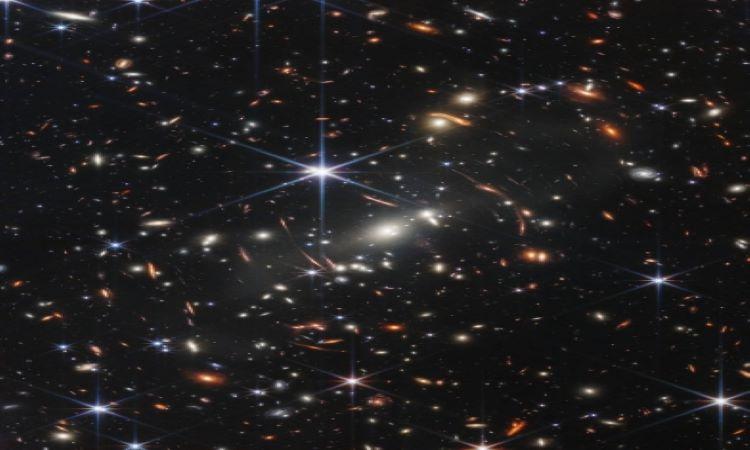Science is always in search of an equation for confirming a proposition while Philosophy rises above the details and reaches an empirical deduction through imagination.
Theories of universe combine science and philosophy- the latter inevitably bringing in the idea of God to fill in the unexplained blanks in the man's understanding of universe.
Philosophy sensed that time and space had no beginning or end - which was an attribute of God. Science is struggling with this interpretation but it has already moved to explore space and its lifespan which is a function of time.
It has not put a seal on any aspects of universe beyond the stipulation of scientists that space was still expanding. They have furnished 'infinity' as a part of equation on the advance of both space and time. Infinity can also be envisaged as the answer to what separates 'beginning' from the 'end'.
Seen from the presumed 'end', the point of 'origin' would also be away by infinity. Infinity is science's way of conceptually measuring 'infiniteness'.
Both space and time are on a course. The question is whether this course was irreversible. However, if something has no beginning nor an end then theoretically these two terminals have to merge to make the process reversible. Infinity is a step towards examining universe from this angle.
Infinity has received acceptance and recognition as an equation of science but has not yet offered an explanation of reversibility of an expanding universe or a retraction in the movement of time. The 'uncertainty' principle is another invention of science which acknowledges that in a non-static universe no positioning of any element thereof could be defined with certainty.
Now, if space has to be expanding in all possible directions and time also must free itself of a linear conceptualisation then science would have to explore how their beginning and end must merge. This merger would have the effect of accommodating both 'infinity' and ;uncertainty' and making the cosmos a constant.
In a sense, the entirety of time and space was equated by philosophy with an omnipresent God. What Science could look at is a theory that would embrace space and time in a 'constant' by using 'infinity' and ;uncertainty' as factors in the equation for proof.
Meanwhile, theories like the 'evolution' of species, 'relativity' and 'action evoking equal but opposite reaction', are all dealing with parts of the 'whole' that universe was. A fundamental discovery is that matter was indestructible - it can only change into energy - and the fact that 'stability' was rooted in high velocity circulatory 'movement' as was the case with an atom on the inside.
'Relativity' does not demolish the theory of the absolute as it can exist within the cosmological constant. Equality of 'action' and 'reaction' is a part of the interplay of 'stability' and 'motion'. Even the established interdependence of flora and fauna is a fact which is essentially a detail about how life as a product of 'evolution', was managed.
Science has found answers to many subsidiary queries that arise in a discussion on universe. Hindu Philosophy used the adjective 'Anant' or 'without an end', for the universe - which is also applied to God. Science has to establish that seamless transition was possible between a 'beginning' and the 'end' in relation to space and time to get the universe to measure up to this description.
The challenge for science is that if it worked on a 'part' of the undefined 'whole' then the experiment would find it intrinsically difficult to totally explain the latter and reach definitive terms for that purpose.
Also Read | Young Oppn leaders set an example by joining hands against BJP
This limitation of science can be overcome through imagination - Einstein, perhaps the greatest scientist of all times, famously said that "imagination is more important than knowledge".
In the case of universe, science has to prove that 'end was equal to beginning'. What is that journey that ends where it began from? It perhaps means that motion was an illusion and that what was seen or felt as a moment of the journey was a point that never in fact moves.
'Relativity' explained this at least partly. The thought that what you see is not the reality, is close to the Hindu spirituality's Maya - an illusion or a dream - believed to be a manifestation of God.
Could a dream be examined by a person who had woken up to sense what part of the dream envisaged reality. The message was that examination of universe should help to focus on 'how it got created'.
Time and space are not measurable as they are everlasting and free from a beginning or an end and human endeavour to examine the universe from within is inherently handicapped but Science has managed to get a part answer in 'infinity' and 'uncertainty' which it has to use to construct the new equation that would link the points of 'origin' and 'termination'.
The remarkable Hindu thought of Pralaya or deluge not only defined an end of the universe but also saw in it its beginning. Again, the proven phenomenon of 'black hole' marks the interconversion of the 'seen' and the 'unseen'. Scientifically speaking since an atom had no length or breadth, any amount of matter can theoretically be condensed into 'nothingness'.
Scientists have thus reached quite a few answers to the puzzles of the universe and reduced the distance between the 'thought' and the 'reality'. The key lies in arriving at the interpretation of space and time that establishes their continuum.
Leading scientists of our times have struck a note of confidence and hope that the status of universe will be defined in scientific terms soon enough- once an understanding of its origin in timelessness was reached.
Meanwhile, the power of meditative insight into the cosmos revealed by the ancient sages of India, deserves a fresh acknowledgement and appreciation by the realm of science. The observation that 'Rome Rome mein Brahmmand hai' - there is an entire solar world in every particle of the body - was startlingly proven by the structure of the atom.
Similarly, the claim that someone could become invisible or 'antardhyan', seemingly is on all-fours with the discovery of science that 'matter' cannot be destroyed - it could only disappear by changing into 'energy'.
Also, the view that human body symbolising 'life' was a product of the five elements of nature - fire, water, earth, air and space - saw the assimilative link between cosmos and the manifestation of life.
In short, what the sage philosophers essentially realised was that universe was without a beginning or an end and that whatever was 'visible' was part of the invisible 'whole'.
Science is to get this meta-physical equation right notwithstanding the limitations of a human mind. Philosophy could be helping science to draw closer to a solution by stipulating that cosmological constant symbolised the 'singularity' of God - the latter representing the 'unseen' whole behind the 'visible' universe.
Also Read | Islamophobia or genuine concern: Navigating the headwinds of 'love jihad'
Universe will remain, in human thought, inseparable from God even after science confirms that universe was a continuum. Science and philosophy would be describing the same wholeness of universe by different names.


















